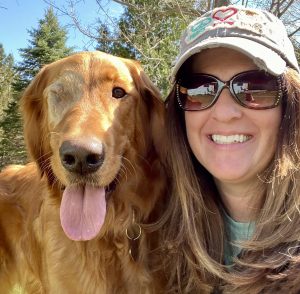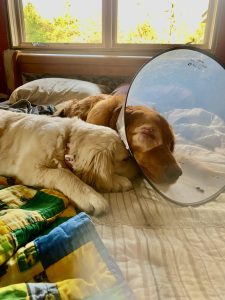TRAVERSE CITY, Mich. (Michigan News Source) – The fungus, Blastomycosis or “Blasto” – which infected 115 workers, hospitalized 14 and killed one worker from the Billerud paper mill in Escanaba, has also taken aim at a northern lower Michigan dog in the Grand Traverse Area.
MORE NEWS: Reward Offered for Fugitive
Maple, a one-year-old golden retriever owned by Interlochen’s Kandace Chapple, wasn’t acting like herself in early April. Maple also had sores on her body. Her condition worsened so Chapple took the dog downstate to a specialist, Dr. Kris Sharpe at BluePearl Pet Hospital. Chapple told Michigan News Source, “Initial treatment was to hospitalize her for four days and test her until they found Blasto. Originally they thought it was cancer in her lymph nodes but found the Blasto fungus in the biopsy. The good news is that Blasto is usually a urine test that takes 3-5 days. We were able to get started almost immediately with Blasto antifungal medication thanks to the surprise biopsy instead. Most Blasto presents in the lungs first, as it is an airborne fungi spore that they inhale. In Maple’s case, it presented in her skin and eye. So many dogs die of respiratory issues. We had a better chance with Maple having clear lungs.”
Maple was in critical condition at the pet hospital and Chapple wasn’t sure if Maple would survive – but the dog got strong enough from her treatment to be able to return home. The fight wasn’t over yet though. Chapple had to make the difficult decision to remove one of Maple’s eyes. Chapple said, “The infection was in her right eye almost from day one. We were treating it with two different drops four times a day for over a month. However, the inflammation in her eye caused her retina to detach, and she lost her vision. From there, she had severe eye pressure and we had to remove it because she was in so much pain. At that point, we really felt that we might be losing the battle and were so heartbroken. But that was actually a good turning point. She was out of all that pain and started perking up. Now we continue the battle with her skin infection. Her left eye remains clear and we are thankful We are calling her our ‘Pirate Dog’!”

Recovery will continue to be a long road for Maple as she continues to take her new medication, gets tested monthly for the infection and continues to be monitored. Chapple and her family decided to fight for Maple because she is so young – just a puppy really. Chapple said, “The doctor told us it was a long shot and a long road, but we did make it through the initial days of her treatment, which was the first battle. Most dogs do not make it more than a few days after being diagnosed. It usually compromises their lungs and they die of respiratory issues. Also, it is a very unpredictable disease and can spread to any organ, making it hard to treat. In Maple’s case, it was in her lymph nodes, eye and skin.”
Chapple continued, “Blasto is so rare that most dogs are misdiagnosed first, losing valuable time. In our case, Maple was misdiagnosed with a possible spider bite and put on medication for that. Her first symptoms were lethargy, a swollen leg and an open sore, which can be indicative of a venomous spider bite, like a brown recluse, which are found in Michigan. Five days later, she was worse, and our vet in Traverse City sent us to an infectious specialist in Grand Rapids, which saved her life.”
Chapple says that Maple’s new medication seems to be working. The medication will be used for a minimum of three months. The vet will test the dog’s levels of infection every month and after the level is at “zero” for two tests in a row, the medication will be used for one more month to make sure the infection is gone. Chapple says that some dogs take up to a year or more to treat and most are tested for the following year to be sure that the infection is still gone as it can come back quickly if any traces of it are missed.

A GoFundMe site has been set up to cover Maple’s past and ongoing medical care. The latest update for the fundraiser from May 8th says, “We are so thankful that so many donations have come in for Maple. She seems better the last few days and no big sores have opened up. We test again May 24. So hopeful this keeps going in this direction.”
MORE NEWS: Big Lots Kicks Off ‘Going-Out-of-Business’ Sales at Remaining Locations
So far, all of the treatments and medications have cost Chapple about $15,000 and the GoFundMe site has raised almost $13,000. Her current treatments are about $350 a month indefinitely including testing and medications. However, if the current meds don’t work, the “next” medication to try is about $2K to $4K a month. Maple is about two weeks into the new medication and her sores are healing so Chapple hopes that it continues to be effective.
Chapple said that the biggest expense was emergency care for four days – but her family decided they could always make more money. She said, “but we could never make more ‘Maple.’ She is a good girl and wonderful dog!”
Chapple has been heartened by the response to her story from the local community and she hopes that by telling her story, she can save other dogs. She said, “The GoFundMe has been the most wonderful lesson in humanity for my family. We felt very alone in this battle with Maple, waking up to new sores each day, tons of vet visits, losing her eye, all the things that were so horrible. Then, suddenly, we were surrounded with love and well wishes and prayers and help to get her to all these things that would save her. When we are through this, we will pay it forward. We now know how much one person can help someone else who is feeling alone. And the echo of Maple’s story has been so far reaching. So many more people know about Blasto now. My number one advice is don’t wait to seek a vet’s care. If they are lethargic or have any kind of odd sore, take them right in!”
Chapple was told by the veterinarians to expect Maple to be treated for six to 12 months and there is still no guarantee she will beat it – but that she has a 50 to 75% chance now after getting through the first few weeks.
Blasto spores can be found in moist and decaying wood, leaves and soil around sandy soil areas and marshy areas near water or new construction areas. According to the CDC, people and animals can get blastomycosis after breathing in the microscopic fungal spores from the air. The fungus is not reported to be transmittable from dog to person, person to dog, person to person or from dog to dog. The infection goes through humans and animals through their respiratory tract after the spores are inhaled. They settle in the small airways and reproduce. After spreading through the body, they can infect other organs.
Human symptoms after getting the infection include fever, cough, night sweats, muscle aches or joint pain, weight loss, chest pain, fatigue (extreme tiredness) and skin legions, bumps, blisters or ulcers. Symptoms in dogs include fever, depression, weight loss and loss of appetite. Other signs include draining skin legions, infection of the eyes, lameness, testicular inflammation, seizures, coughing, and enlarge lymph nodes.
According to VCA Animal Hospitals, the incidence of blastomycosis in cats and humans is much lower than in dogs. Dogs are estimated to be about ten times more likely to contract the disease than humans, and approximately 100 times more likely than cats. Although the fungus is more common in dogs than in people, it has rarely been seen in northern Michigan. However, cases have increased a little in Michigan according to Dr. Abby Roeters, a veterinarian at the Grand Traverse Veterinary Hospital who spoke with Up North Live about the fungus and told them her office has seen a “little bit of an influx in the last few years in Michigan.”
Just how often the fungus is showing up in dogs in northern Michigan – or the rest of the state – is unclear as it is not a “reportable” disease through the Michigan Department of Agriculture and Rural Development (MDARD). The list of reportable diseases helps MDARD monitor, control or eradicate a disease.
Because dogs run around outside and like to dig up soil, they are more likely to breathe in the naturally occurring spores, thus more susceptible to getting the fungal infection than their human owners. Dr. Roeters says, “We tend to see it in kind of sandy soil areas, marshy areas near water. Those are the most common areas that a dog would come into contact with that. Especially dug-up areas, so new construction type of areas, dogs who like to dig in the dirt and stick their nose in the dirt.”
According to states that track Blasto, there are only about one or two cases per 100,000 population a year. In Grand Traverse County, with a population a little over 95,000, let’s hope that means that Maple’s case of Blasto is the only one this year – but remain vigilant to make sure that it is.

Leave a Comment
COMMENTS POLICY: We have no tolerance for messages of violence, racism, vulgarity, obscenity or other such discourteous behavior. Thank you for contributing to a respectful and useful online dialogue.